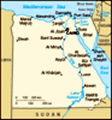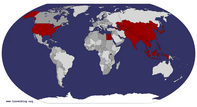Advertisement
Host fam up to no good again. About a month ago host mom shows me a brochure, tells me to save May 18th. Its to a hotel in Kamogawa, Chiba Prefecture(2 hours from Tokyo) called Arabianart - an Egyptian themed hotel (but really turns out to be more of a large bed and breakfast. We spent the weekend there. I had no clue why host mom chose this place; its pretty out of step from the gigantic 4 star resorts they are members too. But its a good thing we did. Great palace. We traveled with a few extra people - host father's younger brother, his son, daughter in law, and 8 month old kid, as well as host mother's nephew who just started going to school in Tokyo. The hotel was not the mega-jaw-dropping luxury, but because it had more of a human touch to it - family run - something missing from a lot of the Tokyo and Tokyoite culture.
Kamogawa is a medium-sized port town 2 hours from Tokyo. Lots of nice seafood. But the hotels were really the special part. As we were driving up this small hill to our hotel, the two hotels we passed
on the way were very similar. Small, pretty, independently run, foreign themed. Before we hit Egypt we hit Spain and France. I have some pics of Spain as well in the blog. The hotel consisted of a lobby, lounge, small kitchen, dining room, and probably about 8 rooms, of which we took up 4. The family who built and ran the hotel lived in Egypt for 6 years. They spoke English and were very excited to have a non-Japanese person to talk to. The entire hotel was decorated with items from Egypt or the Egypt-inspired paintings of the owner's wife. The owner was very friendly, spoke great English, and kept saying how wonderfully he was treated in Egypt by the Egyptian people and deeply respected the host family for taking care of me and showing me Japan. I agree 100%.
The food was all prepared by the owning family, in house. A lot of the food they grew themselves. As the owner explained, in both Japanese and English (although at this point I don't need the translation but I could tell he really wanted to speak English) the food was mainly Egyptian, changed a bit to make it easier

 "Arabian Lawrence"
"Arabian Lawrence"
This the Japanese titlefor Japanese to eat (turn down the spice and oil - had a conversation about this after dinner.) We got full explanations of Egyptian life for them, the food, and the inspiration for the hotel. The human touch, the handmade - if not perfect - feeling, was really refreshing. After dinner the son of the family entertained us with some Egyptian drumming, then we all dressed up in middle eastern clothes.
Next day we took a trip to a hill with a statue of a mermaid (port town). Host father explained that the original purpose was to look for fish coming in from the deep ocean, but now is a place where couples go to attach locks to the metal fence surrounding the statue with various promises on it. Got some pics of the amazing view from the top, as well as these locks. One as recent as 2 days before.
I realized today something that was long coming: that Japanese people are not always the nicest, and the unmistakable, characteristic politeness has its deep and serious downsides. First, I need to go into the language a bit more. There is no language in the world constructed

 Abalone
Abalone
Brought out live, cooked over a sternoto erect barriers between people like Japanese is. There are various levels of politeness that you need to fit yourself and the people you interact with into. And if you don't, its social taboo. As you can expect, it causes a lot of uneasiness until you find your "level" and a lot of unnecessary tension even when you do because there are these lines you must follow, or in the lower person's case, hoops you must jump through. This is not my culture and has nothing to do with me - since I get close to a free pass for finding the exact right level for myself and the people around me, but I still have to use a few different forms to be nice - but it bothers me a bit.
The way extended FAMILY and close friends talk and walk on needles is ridiculous. By this, I mean the case of host mother's nephew, and the close friends of Yuka, Nana, and the older son who still have ties with the family. They use the same polite forms as found in Japanese workplaces between a supervisor/employee relationship. Its not keigo, the really bow-down-and-grovel superior/inferior language, but it

 Host parents
Host parents
Beaches are rocky - like San Fran Pacificis not the natural short form enjoyed freely by equals. Since I have gotten used to the language, its just odd to hear this tension, this barrier that the words put up. When I talk to my aunts, uncles, and especially my friends parents, its the same way I talk to my close friends. And they talk the same way back. Comparing those relationships I have, and the short form of Japanese, to the polite forms used in these situations, there is such a bizarre tension. Just imagine using the same "Mr." or "Mrs." when addressing your aunts, uncles, or best friends parents. But then apply that same formality to every verb in the language. It's kind of that weird. But the society is really stratified like that.
Interesting thing when I was talking to the owners of the hotel. Because they are the owners and we the guest, they had to put on the ultimate respect language when talking Japanese, but in English, there is no such language. Of course, me talking to them in English was easier than me speaking Japanese, but there was another element to it as well that had nothing to do with language

 ....
....
Chiba prefecture grows peanuts. Meet their mascot. He is excited.proficiency. It was how the conversation can flow better when we both spoke the same language as equals rather than stuck in host-guest relationship of keigo.
Now another thing, that does have to do with me and I am starting to take personally, is how Japanese in all their politeness, are really xenophobic and arrogant inside. Even among my host family, who treats me as well as family, shows this darker side of the Japanese. There seems to be the belief that because I am not Japanese, I can not understand Japanese things or eat their food. There are always the unnecessary attempts at translation of certain things, the need to reconfirm that I understand what is being said, etc. Host father's brother was amazed that I can eat certain foods and could use chopsticks, as well as spoke to me like I was an infant. This was the kind of reaction and treatment that happens when you believe that it is impossible for someone NOT japanese to do something. Which is entirely different from a reaction when someone from a different culture tries to participate in yours. It as if they and their standards are untouchable and unreachable.

 Environmental Control
Environmental Control
Most rivers are cemented, shorelines lined with erosion barriers, and hills covered in mesh. Public works spending keeps employment low and companies happy.Even after 8 months, there is the assumption that I don't understand. Because "Japanese is difficult" that is said patronizingly with that Japanese smile and nod that that is starting to wear me a bit thin. The worst at this the older host sister, Yuka. And no one can entertain the idea that English is harder than Japanese, although it absolutely is.
Then there is the food. My battleground. There is the belief that not only is Japanese food the best around but the Japanese attempts at Western food are better than the original, even when in reality you can't compare the too because a lot of the imported cuisines are Japanified. I've heard many stories about going abroad and not being able to eat the food for this and that reason, that is not as good, healthy, clean, etc. One big thing here is that if the food is not grown or advertised as an in country product, the price is halved for good measure. Three times this week I was stopped in mid order or mid purchase at a restaurant, kind of glared at uncertainly, then asked if I knew what I was ordering or buying and
then if I knew how to eat what I ordered. And these things were not asked in a "I would like to share my culture via food by teaching you" way, but more of a "There is no way in hell this white guy knows what to do with soba." I guess one of the downsides to learning a language is knowing when you are being laughed at inside or doubted.
It's got to be part of living on an island. Legally, linguistically, and socially Japan is a hard place to break into as a foreigner, as shown by their stunning 1.2% non-ethnic Japanese population. Best jaw-dropper was probably from my friend Dave's family, that Japanese have different DNA from everyone else. Although I get pissed when questioned if I know that I am buying salty, sour, pickled plum candy, I think that wins for xenophobia.
Advertisement
Tot: 0.187s; Tpl: 0.013s; cc: 10; qc: 48; dbt: 0.0774s; 1; m:domysql w:travelblog (10.17.0.13); sld: 1;
; mem: 1.2mb





















Aunt Melissa
non-member comment
No Man is an Island
I read an article recently about Japan continuing to be one of the few truly homogeneous populations remaining in the modern world. Sounds like you are experiencing both the wonder and the frustration of both sides of this coin. It is difficult to imagine as our culture is so diverse and heterogeneous - but a unique experience which will serve you well. Sending a kiss and a hug - "Mrs. Migliaccio". :)